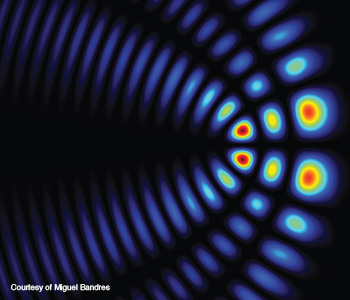Feature
Accelerating Optical Beams
Thanks to their unique interference, accelerating beams appear to curve as they travel. They require no waveguiding structures or external potentials and appear even in free space. This beautiful phenomenon has led to many intriguing ideas and exciting new applications.
 Transverse invariant profile of a 3-D non-paraxial accelerating beam.
Transverse invariant profile of a 3-D non-paraxial accelerating beam.
The idea that light travels in straight lines has been ingrained in human consciousness since antiquity. Centuries after it was postulated by Euclid in his Optica, it became one of the pillars of Newton’s corpuscular hypothesis. Even with the advent of wave theories and Maxwell’s electrodynamics, this basic premise persisted as an outcome of electromagnetic momentum conservation.
…Log in or become a member to view the full text of this article.
This article may be available for purchase via the search at Optica Publishing Group.
Optica Members get the full text of Optics & Photonics News, plus a variety of other member benefits.

